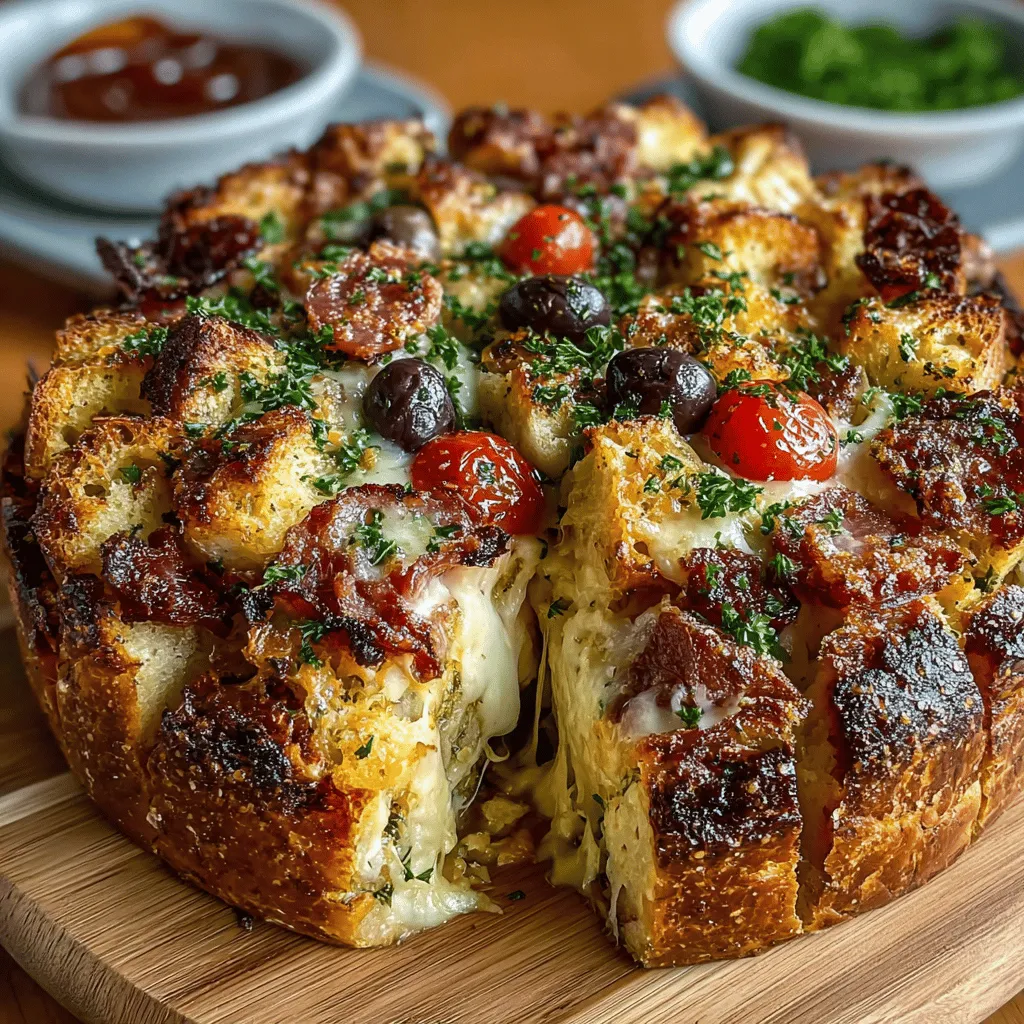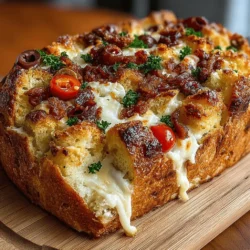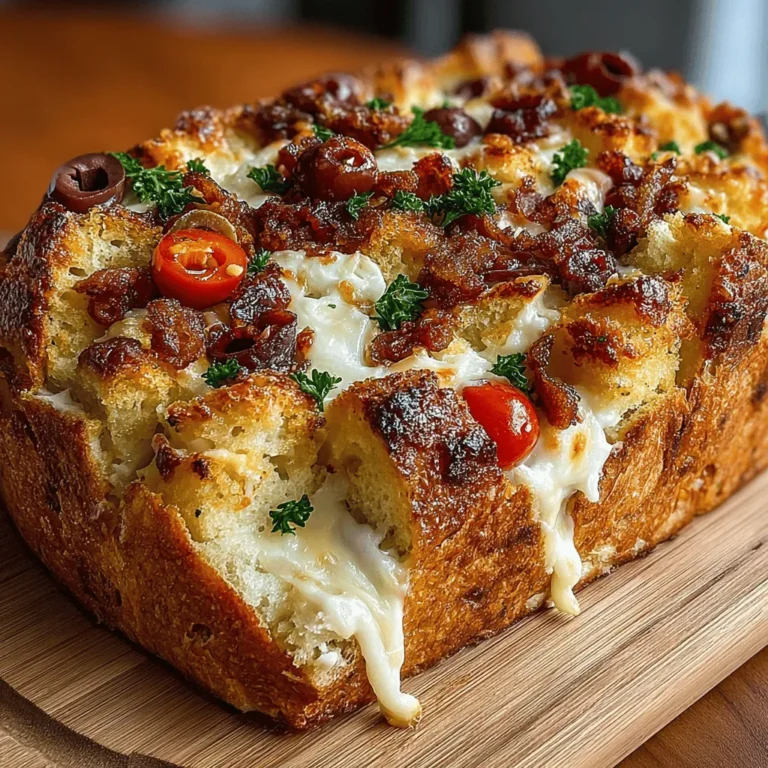Indulge in Flavor: The Ultimate Charcuterie Board Casserole Recipe
Introduction
The charcuterie board has become a staple in gatherings, celebrated for its ability to bring together an enticing variety of cured meats, cheeses, and accompaniments. This culinary tradition invites guests to indulge in a symphony of flavors and textures, making it a perfect choice for entertaining. However, what if the essence of this beloved appetizer could be transformed into a warm, comforting dish? Enter the Charcuterie Board Casserole—a creative twist that reimagines all the beloved components of a charcuterie board into a savory baked delight. Ideal for brunch, a cozy dinner, or a social gathering, this casserole is not only straightforward to prepare but also promises to be a true crowd-pleaser.
In this article, we will delve into the origins of charcuterie, explore the key ingredients that make this dish special, and guide you through the initial steps of preparing your Charcuterie Board Casserole.
Understanding the Charcuterie Board Casserole
To fully appreciate the Charcuterie Board Casserole, it’s essential to explore the concept of charcuterie itself. The term “charcuterie” originates from France, where it historically referred to the art of preparing and assembling cured meats and accompanying items. Traditionally, charcuterie boards feature a selection of meats such as salami, prosciutto, and pâté, alongside various cheeses, olives, pickles, nuts, and fresh fruits. The charm of a charcuterie board lies in its presentation and the opportunity for guests to customize their plates, sampling a little of everything.
The cultural significance of charcuterie extends beyond France, as many countries have their own variations that highlight local ingredients and flavors. For example, Italian antipasti, Spanish tapas, and Middle Eastern mezze all reflect the same spirit of sharing and communal dining. The appeal of the Charcuterie Board Casserole lies in its ability to encapsulate these diverse elements into a single dish, making it not only comforting but also a culinary conversation starter. This casserole presents an innovative way to enjoy the familiar flavors of a charcuterie board in a warm, satisfying format.
Ingredients Breakdown
The magic of the Charcuterie Board Casserole lies in its ingredients. Each component contributes to the overall texture and flavor, ensuring that every bite is a delightful experience. Here’s a closer look at the key ingredients that make this dish shine:
1. Sourdough Bread: The foundation of the casserole, sourdough bread provides a robust texture and a tangy flavor that perfectly complements the other elements. Its ability to absorb the egg and milk mixture makes it an ideal base, resulting in a custard-like consistency that is both satisfying and delicious.
2. Cheese Selection: Cheese is the heart of any charcuterie board, and for the casserole, a blend of cheeses can elevate the dish. Options like sharp cheddar, creamy brie, and nutty Gruyère create a rich, cheesy delight that melds beautifully during baking. The key is to balance flavors and textures, ensuring that each cheese enhances the overall experience.
3. Cured Meats: The inclusion of cured meats adds depth and savory notes to the casserole. Salami brings a spicy kick, while prosciutto offers a delicate, salty flavor. Chorizo can introduce a smoky element, creating a well-rounded blend of tastes. Selecting a variety of meats ensures that your casserole is packed with flavor and satisfies meat lovers.
4. Olives and Vegetables: To add freshness and brightness, incorporating olives and vegetables is essential. Olives contribute a briny contrast, while cherry tomatoes can add a pop of color and juiciness. Consider adding other vegetables like bell peppers, spinach, or even artichokes to further enhance the flavor profile.
5. Nuts: Adding a crunch factor, nuts like walnuts or pecans can provide a delightful texture contrast against the creaminess of the casserole. They also contribute a nutty flavor that complements the richness of the cheese and meats.
6. Egg and Milk Mixture: The binding agent for this dish, a mixture of eggs and milk creates a rich, custard-like consistency that envelops all the ingredients. This mixture ensures that every bite is moist and flavorful, making the casserole indulgent and satisfying.
Preparation Steps
Now that you have an understanding of the key ingredients, it’s time to prepare your kitchen for casserole success. Here are the initial steps to ensure a smooth cooking process:
1. Gather Your Ingredients: Before you start cooking, gather all the ingredients listed above. Having everything within reach will streamline your preparation and allow you to focus on assembling the casserole.
2. Preheat Your Oven: Preheating your oven is crucial for achieving the perfect texture. Set your oven to the required temperature (usually around 350°F) and allow it to fully heat while you prepare the casserole.
3. Prepare the Bread: Cut the sourdough bread into bite-sized cubes. This will help it soak up the egg and milk mixture while ensuring even distribution throughout the casserole. If desired, you can toast the bread cubes lightly in the oven for added texture.
4. Mix the Egg and Milk: In a large mixing bowl, whisk together the eggs and milk until well combined. Season the mixture with salt, pepper, and any additional herbs or spices you prefer. This step is essential as it will flavor the entire casserole.
5. Chop and Assemble: Chop the cured meats, cheese, olives, and any vegetables you want to include. Once everything is prepared, begin layering the ingredients in a greased casserole dish, starting with a layer of bread cubes followed by meats, cheeses, and veggies. Repeat the layers until all ingredients are used, ensuring that they are evenly distributed.
This preparation lays the groundwork for a delicious Charcuterie Board Casserole that promises to be a hit among family and friends. As you continue with the next steps, you will discover how to bring this dish to life, creating a warm and inviting meal that captures the essence of a traditional charcuterie board in a unique and satisfying way. Stay tuned for the next part where we will cover the baking process and tips for serving your casserole to ensure it’s a memorable experience for all.

Essential Tools and Equipment Needed
Before diving into the sumptuous world of Charcuterie Board Casserole, gather the essential tools and equipment that will make your cooking experience seamless and enjoyable. The following items are necessary to prepare this delightful dish effectively:
– Large Mixing Bowl: For combining the ingredients.
– Whisk: To blend the egg mixture smoothly.
– Baking Dish: A 9×13 inch or similar size casserole dish works best.
– Cutting Board: For chopping meats, cheeses, and vegetables.
– Chef’s Knife: A sharp knife will make your prep work easier.
– Measuring Cups and Spoons: For accurate ingredient measurements.
– Spatula: For mixing and serving.
– Aluminum Foil: To cover the casserole during baking, if necessary.
– Oven Mitts: For safely handling hot dishes.
Having these tools handy will streamline your cooking process, allowing you to focus on creating a delicious meal.
Step-by-Step Guide to Preparing the Casserole
Preheating the Oven: Setting the Stage for Perfect Baking
Start by preheating your oven to 350°F (175°C). Preheating is crucial as it ensures the casserole bakes evenly throughout. A hot oven helps create that golden, crispy top while maintaining a soft, fluffy interior, which is essential for the ultimate Charcuterie Board Casserole experience.
Preparing the Bread Base: Ensuring Even Distribution of Flavors
While the oven is preheating, prepare the bread base. Choose a hearty bread such as sourdough, ciabatta, or French baguette.
1. Cut the Bread: Chop your chosen bread into bite-sized cubes, approximately 1-inch pieces. This size allows the bread to absorb the flavors while maintaining a satisfying texture.
2. Toast the Bread (Optional): For extra crispiness, you can toast the bread cubes in the oven for about 10 minutes or in a skillet with a touch of olive oil until golden. This step adds depth to the flavor and prevents the casserole from becoming too soggy.
3. Layer the Bread: In your greased baking dish, evenly distribute the bread cubes at the bottom. This will serve as the foundation that holds all the delicious toppings and flavors of your casserole.
Crafting the Egg Mixture: Achieving the Ideal Texture and Seasoning
Next, it’s time to create the egg mixture that binds the casserole together.
1. Combine Eggs and Dairy: In a large mixing bowl, whisk together 6 large eggs and 1 cup of milk (or your preferred dairy alternative). This combination provides richness and moisture to the dish.
2. Seasoning: Add in your preferred spices. A pinch of salt, black pepper, garlic powder, and a dash of dried herbs such as thyme or rosemary will enhance the flavor profile. You can also incorporate a splash of Dijon mustard for a subtle tang.
3. Mix Thoroughly: Whisk the mixture until it’s well combined and slightly frothy. This aeration will help create a light, fluffy texture once baked.
Combining and Soaking: Importance of Allowing Flavors to Meld
Now, it’s time to combine all elements and let them meld:
1. Layering Ingredients: On top of the bread cubes, layer your favorite charcuterie ingredients—this can include diced cooked meats (like ham, salami, or bacon), a variety of cheeses (such as cheddar, Gruyère, or goat cheese), and any additional toppings like roasted vegetables or olives. Be generous; the variety is what makes this casserole a true charcuterie experience.
2. Soaking: Pour the egg mixture evenly over the layered ingredients in the baking dish. Gently press down with a spatula to ensure all the bread is soaked in the mixture. This step is vital; it allows the bread to absorb the flavors fully and ensures a cohesive dish.
3. Resting Time: For optimal flavor, let the casserole sit for about 15-20 minutes before baking. This resting period helps the bread absorb the egg mixture, resulting in a more flavorful casserole.
Baking the Charcuterie Board Casserole
The Importance of Temperature and Timing
Now that your casserole is assembled, it’s time to bake it to perfection.
1. Baking: Place the casserole in the preheated oven and bake for 35-45 minutes. The baking time can vary based on your oven, so keep an eye on it toward the end.
2. Optimal Baking Conditions: For a beautifully golden top, consider covering the casserole with aluminum foil for the first 20 minutes. This helps it cook through without browning too quickly. Remove the foil for the last 15-20 minutes to achieve that perfect golden crust.
How to Check for Doneness: A Foolproof Method
To ensure your casserole is perfectly cooked, insert a knife or toothpick into the center. If it comes out clean or with only a few moist crumbs, your casserole is ready. If there’s still wet egg mixture clinging to it, return it to the oven for an additional 5-10 minutes of baking.
Serving Suggestions
Presenting Your Casserole with Style
Once your Charcuterie Board Casserole is baked to perfection, it’s time to plate it up with flair. Here are some creative ways to serve and garnish your casserole:
1. Garnish: Consider fresh herbs like parsley, chives, or basil sprinkled on top for a pop of color and freshness. A drizzle of high-quality olive oil or balsamic glaze can also elevate the presentation.
2. Serving Style: Cut the casserole into squares or rectangles for serving. You can place each piece on a rustic wooden board or individual serving plates for an inviting presentation.
Creative Ways to Serve and Garnish the Casserole
Beyond garnishing, think about how to enhance the dining experience:
– Accompaniments: Serve with a side of mixed greens drizzled with a light vinaigrette or a fresh tomato salad to add a refreshing contrast to the richness of the casserole.
– Charcuterie Enhancements: Offer additional charcuterie items such as sliced meats, cheeses, nuts, or fruits on the side, allowing guests to customize their plates further.
Pairing Ideas: What Goes Well with the Charcuterie Board Casserole?
To complement the rich flavors of your casserole, consider these pairing ideas:
– Wine Recommendations: A light-bodied white wine, such as Sauvignon Blanc or a fruity Pinot Noir, pairs beautifully with the savory flavors of the casserole. For those who prefer red, a light-bodied Merlot offers a nice balance.
– Beverage Ideas: If you’re looking for non-alcoholic options, a sparkling water with a twist of lemon or a refreshing iced tea can cleanse the palate and enhance the meal.
Conclusion
The Charcuterie Board Casserole blends the beloved flavors of a classic charcuterie board into a hearty, satisfying dish that everyone will enjoy. Whether you’re hosting a gathering or simply treating yourself to a comforting meal, this casserole is a versatile option that can be customized to fit your taste preferences. With its rich flavors and delightful textures, it’s sure to become a staple in your recipe collection, allowing you to savor the essence of charcuterie in a new and exciting way.
This casserole not only serves as a unique centerpiece for gatherings but also makes for excellent leftovers, retaining its deliciousness when reheated. The next time you’re looking for a dish that pleases a crowd and brings comfort to your table, look no further than the Charcuterie Board Casserole. It’s a delightful way to enjoy the essence of charcuterie in every delicious bite.

